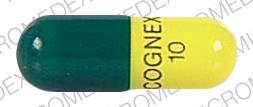Tacrine Disease Interactions
There are 4 disease interactions with tacrine.
Cholinesterase inhibitor (applies to tacrine) coronary artery disease
Major Potential Hazard, High plausibility. Applicable conditions: Ischemic Heart Disease
The use of cholinesterase inhibitors has been associated with a constriction of coronary arteries. Therapy with cholinesterase inhibitors should be administered cautiously in patients with coronary artery disease.
Cholinesterase inhibitor (applies to tacrine) parkinsonism
Major Potential Hazard, High plausibility.
Cholinesterase inhibitors should be used with caution in patients with parkinsonism. Some of these drugs might be contraindicated in these patients (refer to specific prescribing information). Symptoms of Parkinson's disease may be exacerbated with the increase in cholinergic activity. Caregivers and patients should be advised.
Tacrine (applies to tacrine) hepatic dysfunction
Major Potential Hazard, High plausibility. Applicable conditions: Liver Disease
The use of tacrine is contraindicated in patients with a history of tacrine-induced jaundice confirmed by elevated total bilirubin greater than 3.0 mg/dl. Elevations in liver function tests (LFTs) have been reported in as many as 50% of patients receiving tacrine. Twenty-five percent of patients may experience a 3 fold rise in ALT and 7% a 10 fold rise in ALT. LFTs should be monitored prior to initiation of tacrine therapy is initiated and when dosages are altered. Tacrine undergoes extensive first-pass metabolism by the liver (CYP450-1A2) to multiple forms. The metabolic and therapeutic activity of tacrine can be altered in patients with compromised hepatic function and therapy with tacrine should be administered cautiously in these patients.
Cholinesterase inhibitor (applies to tacrine) hyperthyroidism
Moderate Potential Hazard, High plausibility.
Many of the manifestations of hyperthyroidism may be exacerbated by increased levels of acetylcholine produced by cholinesterase inhibitors. Therapy with cholinesterase inhibitors should be administered cautiously to patients with hyperthyroidism. Monitoring of thyroid levels is recommended.
Switch to professional interaction data
Tacrine drug interactions
There are 437 drug interactions with tacrine.
Tacrine alcohol/food interactions
There is 1 alcohol/food interaction with tacrine.
More about tacrine
- tacrine consumer information
- Check interactions
- Compare alternatives
- Side effects
- Dosage information
- During pregnancy
- Drug class: cholinesterase inhibitors
Related treatment guides
Drug Interaction Classification
| Highly clinically significant. Avoid combinations; the risk of the interaction outweighs the benefit. | |
| Moderately clinically significant. Usually avoid combinations; use it only under special circumstances. | |
| Minimally clinically significant. Minimize risk; assess risk and consider an alternative drug, take steps to circumvent the interaction risk and/or institute a monitoring plan. | |
| No interaction information available. |
See also:
Further information
Always consult your healthcare provider to ensure the information displayed on this page applies to your personal circumstances.


